The Leaders Debate: how they spun it on social
- Published
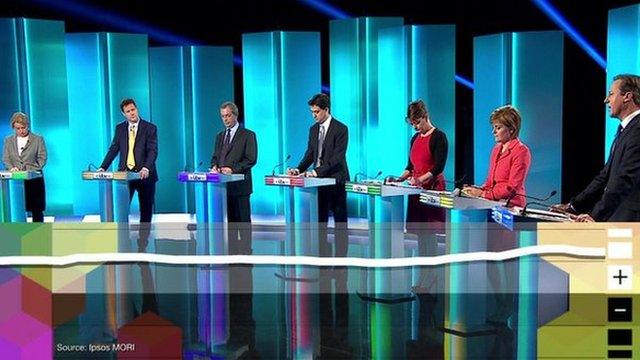
The key social media messages were shared before the Leaders Debate had even finished.
During the first TV general election debate on ITV and afterwards, each of the seven parties used carefully crafted online tactics to convince people that their narrative of the debate was the "correct" version.
After all, the seven UK political parties whose leaders participated know that many of those who didn't watch - and indeed many of those who did - will surf their social media timelines to get a first take on how it went.
Each party created a version of events for their supporters to share with their friends and family. But the tactics each party used were very different from each other.
Labour: "Britain succeeds when working people succeed"
The Labour party were the first political party to upload a clip from the live programme onto Facebook, turning around Ed Miliband's opening remarks five minutes after they were broadcast. They then kept uploading Milliband's statements - "Ed Miliband explains how Labour will put controls on immigration," for example, rapidly got 20,000 views.
During the debate Shadow Justice Minister Sadiq Khan answered questions from Facebook users, answering such important queries as "Does David Cameron have a moon face?" and "where did you get that lovely jumper?" (TK Maxx, it turned out).
There were also attack memes about David Cameron being created in Labour's social media timelines - for example one which picked up on a brief remark about zero-hours contracts.
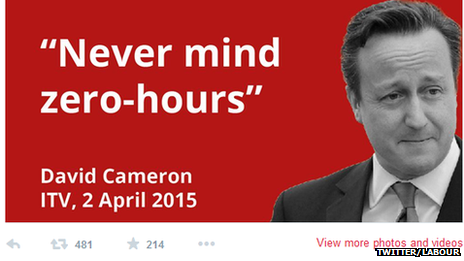
Since the Labour campaign team knew what their leader was going to say in his opening remarks they were able to intercut them with a much more highly produced video which was uploaded to social platforms eight minutes after the debate programme ended. This video was previewed with the line "Britain succeeds when working people succeed".
Conservatives: "Cameron in charge"
Despite the fact that they have the most likes on Facebook, the Conservatives did not upload any content to the site during the debate. Instead they appeared to have crafted their messages several hours before the programme went on air.
They shared six key messages on Facebook and Twitter before the debate, which included attacks on Labour, the Liberal Democrats and UKIP. For example, they re-used an old message about Ed Miliband being "in the SNP leader's pocket" to stress to undecided voters that given what some polls have predicted, Ed Miliband may need SNP votes to pass key legislation if he formed a government.
They created a new version of the image to be shared, featuring new SNP leader Nicola Sturgeon rather than Alex Salmond - though it was a an interesting reflection on her performance that memes of the poster, but with Sturgeon's pocket full of Nick Clegg, David Cameron and Ed Miliband, started trending after the debate.
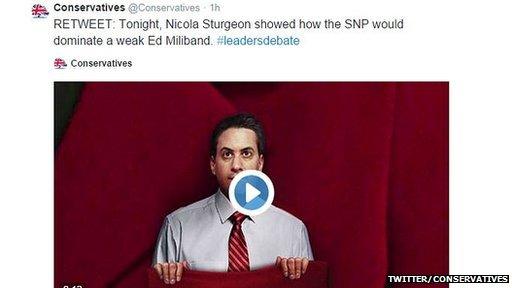
During the debate, supporters and activists stuck to the six key attack messages on social platforms and the party was remarkably quiet on Facebook. But immediately after the debate finished, the Conservatives rolled out a series of online videos under the hashtag #cameronincharge to press home their main message. This tag was used around 1,400 times in the first hour after the programme. The videos contrasted the "chaos" of other party leaders arguing amongst themselves, and the "competence" demonstrated by David Cameron while he answered questions from the audience. "This election is between the competence of a Conservative government or the chaos of Ed Miliband propped up by the SNP," the party later posted on Facebook.
Liberal Democrats "the centre way"
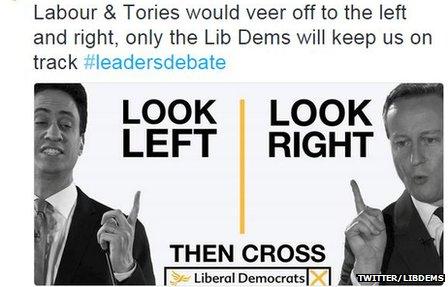
In contrast to the other political parties, the Liberal Democrats were much more focused on re-tweeting comments from activists, political people and the public. Rather than offering their own pre-made interpretation on the discussion, they hosted a live stream on their website, and used Twitter to supplement comments made by Nick Clegg during the programme. For example when Nick Clegg pushed the Conservatives on their plans for the NHS, viewers of the Liberal Democrat live stream were given the option to click on links which outlined the party's NHS policy.
That's not to say they didn't engage in attack campaigning. They used Twitter to promote perceived weaknesses in Labour's position on zero hours contracts, by creating a meme which claimed that 68 former Labour MPs including the Shadow Chancellor Ed Balls had hired people on zero hours contracts.
UKIP: "the only party talking sense"
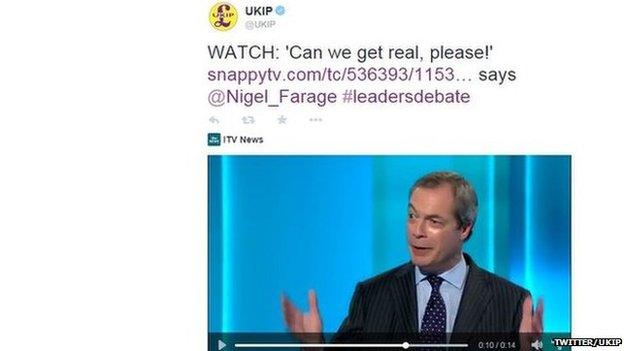
UKIP embraced Nigel Farage's strident debating style in their online response.
His hand gestures during the debate had been ridiculed by other Twitter users, but the party moved in on the joke by sharing an ITV News clip of Farage telling Leanne Wood and Nick Clegg "to please be sensible". The aim seemed to be to reinforce Nigel Farage's opening statement that he was "different from the political establishment".
But it was his comments on the costs to the NHS of treating non-British nationals with HIV that caused the most controversy online. "There are 7,000 diagnoses in this country every year for people who are HIV positive," he said. "Which is not a good place for any of them to be, I know. But 60% of them are not British nationals".
Criticism of the remarks by Plaid Cymru's Leanne Wood, who accused him of "scaremongering," got traction online during the debate. Other leaders were quick to criticise Mr Farage on Twitter after the debate ended - perhaps aware by then that the comments were the most tweeted-about moment in the debate (according to Twitter data). Nick Clegg tweeted that the comments were "simply vile and desperate. Politics in the lowest form". Ed Miliband tweeted: "Nigel Farage's comment about the NHS and HIV was disgusting. He should be ashamed". Mr Farage's official Twitter and Facebook accounts did not engage in the furore after the debate. Young UKIP supporters continued to promote their own political party memes under #TeamNigel, but the party went back to releasing more traditional style campaign posters on its Facebook page.
SNP: "an alternative to austerity"
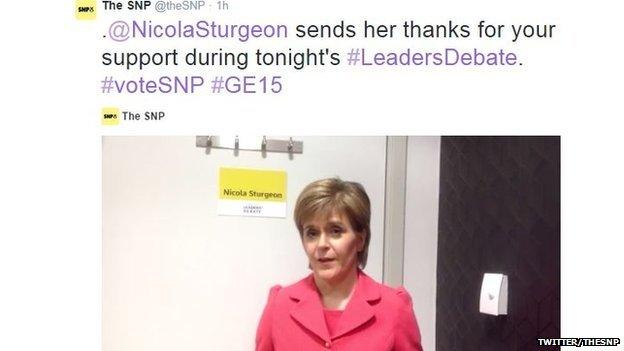
SNP supporters online seemed slightly sidetracked at the beginning of the debate, as they engaged in an energetic discussion about a post from the British National Party (former party leader Nick Griffin had shared an image of people from minorities wearing kilts to criticise SNP refugee policy).
Like Labour, the SNP were quick to turn around videos for social platforms during the debate. The party's Facebook page filled with clips from the programme which emphasized Nicola Sturgeon fighting for Scotland. They were labelled with quotes from Ms Sturgeon such as "we've seen tonight why we need to break the old boys' network at Westminster".
In the run-up to the debate key figures within the SNP like Angus Robertson had featured in "video diary" style clips which urged supporters to engage in the political discussion online. These videos have formed a key party of the party's political strategy since the independence referendum, and often have a "behind the scenes" feel. Immediately after the debate, Nicola Sturgeon recorded a video diary thanking supporters for sending her direct messages and reminding them of her "alternative message on austerity".
Green Party: "no to politics as usual"
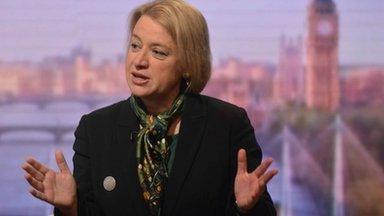
The debate was seemingly a social media success for the Greens: the fourth most popular link shared on Twitter during the debate seems to be the Green Party's campaign website (the others were news reports). This is especially striking as the Greens were the only party not to upload a significant volume of Leader Debates specific content onto their Facebook page in the hours leading up to the debate, although during the debate they posted campaign posters which highlighted the achievement of their first green MP Caroline Lucas.
One of the funnier aspects of the wider discussion on social media was that many people appeared to have not realised that the Greens' leader Natalie Bennett is Australian until today. One said:, external "#greenparty And Australian?? Don't we have some kind of heritage requirements??".
Plaid Cymru: "a strong voice for Wales"
The Welsh Nationalist Party took a pop art approach to their social media campaign during the debate, posting treated images of Leanne Wood and cartoon drawings of bankers.
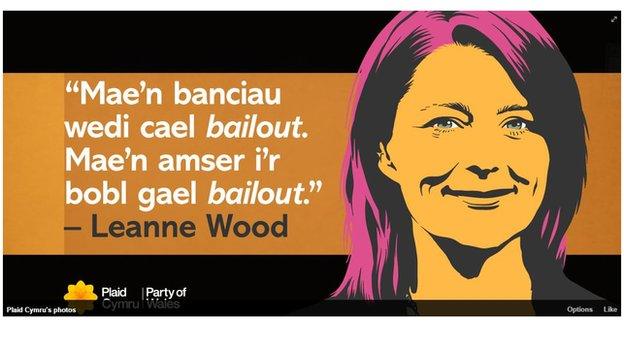
"The banks have had a bailout. It's time for the people to have a bailout."
The party also celebrated her apparently positive reception by the studio audience. They released a six second vine video of the applause after Leanne Wood accused Nigel Farage of "dangerous scaremongering".
Reporting by Hannah Henderson, Ravin Sampat and Mukul Devichand
Next story: The faces of prostitution in Australia
You can follow BBC Trending on Twitter @BBCtrending, external, and find us on Facebook, external. All our stories are at bbc.com/trending.